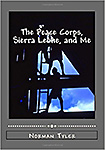Review — THE PEACE CORPS, SIERRA LEONE, AND ME by Norman Tyler (Sierra Leone)
The Peace Corps, Sierra Leone, and Me
Norman Tyler (Sierra Leone 1964–66)
CreateSpace
August 2015
191 pages
$12.50 (paperback), $3.99 (Kindle)
Reviewed by Mark D. Walker (Guatemala 1971–73)
•
THIS MEMOIR IS ABOUT THE JOURNEY of a naïve 19-year-old who joins the Peace Corps and heads “up-country” to Kenema, Sierra Leone, on the Liberian border, from 1964 to 1966. His trek was about seven years before my PCV experience in Guatemala, after which I eventually arrived in Sierra Leone with my family as the director of an international child care agency. My experience there allowed me to commiserate with much of Norman’s story. Upon my arrival in Sierra Leone, I remember thinking, “And I thought I knew what poverty was — and diseases — lassa fever and green monkey disease — yikes!” (I don’t remember Ebola being mentioned, but you get the picture). I’ve always admired the PCVs who served and were able to survive the rigors of “Salone.”
The author has made excellent use of his journal and letters to his parents, as well as maps and drawings to describe his journey. He uses “sidebars” to describe a number of the nuances of Sierra Leone, such as its language, “Krio,” which was a dialect based on English developed by returned slaves who had been in America. My personal favorite expression was, “Aw di go de go”? (“How are you doing?”) The author spices up his narrative with a number of local terms such as being “vexed” as opposed to being pissed.
In another helpful sidebar he describes the local “chop” (cuisine), which I never got used to because of the occasional monkey hand at the bottom of the stew. We both enjoyed the national dish, “groundnut stew,” a peanutbutter-based stew for which he provides a recipe.
PCV Norman was an aspiring architect who becomes a “Jack of all trades” as a member of the social development team responsible for infrastructural projects, which meant that logistics would be a key to success. Welcome to “WAWA” (West Africa Wins Again) which, as Norman describes, means that whatever could go wrong will. “Tiffing” (stealing) is a national pastime, for example. The author got up one morning to find all four tires of his Jeep were gone. On another occasion someone poked a stick into his window and made off with his pants. This, of course, meant that he had to “sack” (fire) the night guard, which was always a crap shoot — and also find a competent cook.
The author refers to the Peace Corps Land Rovers as the “bane of my life,” as were the horrendous roads that were downright dangerous possibly due to the 120 inches of rainfall in the wet season and the constant foot traffic. The author’s driving record was sketchy at best, and included running into a local woman, innumerable animals and rolling the old C4211 Land Rover, but he was considered a reliable driver by his fellow PCVs since he didn’t drink alcohol.
Norman usually lived with two or three other Volunteers who produced some interesting scenarios, including several who went literally “comatose” and pouted when they didn’t get their way. One Volunteer disappeared with the only Jeep for three days, bringing work to a grinding halt.
The author reflects upon foreigners’ confrontations with the host culture, and in several cases, the Peace Corps staff neglecting to ask the local villagers what they wanted. Consequently, several building designs that used local materials were “unacceptable” because the villagers wanted something “modern.”
The book provides a broader view of West Africa when the author takes a boat to Nigeria. He also shares the story of a fellow PCV who traveled throughout South Africa, Egypt and into Europe. The Peace Corps, Sierra Leone, and Me is more than a travel memoir; it is of physical and spiritual self-discovery throughout in the topography, culture, cuisine, politics and history of Sierra Leone.
•
As a Volunteer, reviewer Mark Walker implemented fertilizer experiments in Guatemala and Honduras, although his most important accomplishment was his marriage to his wife and three children, all born in Guatemala.
Following earning an MA in Latin American Studies from the University of Texas in Austin, Mark co-founded a Guatemalan development agency and then managed child sponsorship programs for Plan International in Guatemala, Colombia and Sierra Leone. He has written and spoken in English and Spanish at a number of global conferences, including the Hemispheric Congress for Fundraising in Mexico, and has held senior fundraising positions for several groups like CARE International, MAP International, Make A Wish International and was the CEO of Hagar. Most recently, he completed a fundraising study for the National Peace Corps Association as a VP at Carlton & Co.
His involvement promoting “World Community Service” programs led to his receiving the most prestigious Service Above Self Award from the Rotary International Foundation, and all three of his children have participated in Rotary’s “Youth Exchange” program. He is completing his own memoir, Learning from Different Latitudes: How I Changed the World or How It Changed Me. Mark and his wife, Ligia, live in Scottsdale, Arizona close to their three children and six grandchildren.

The author, Norm Tyler, has a writers Blog at his personal web site, tylertopics.com